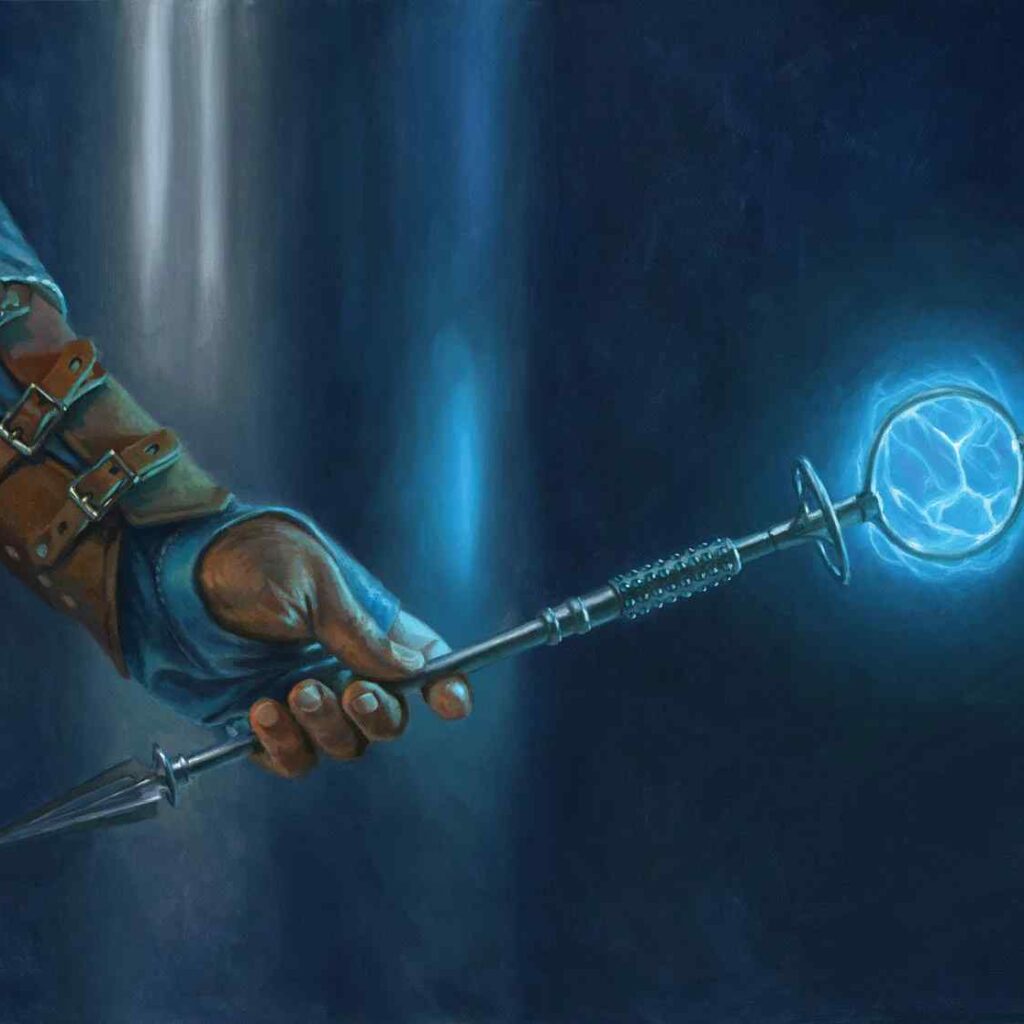Ah, the spellcaster—a D&D foe that can turn the tide of battle with a flick of the wrist. You’ve probably been zapped, charmed, or even turned into a frog. But what if you could turn the tables?
What if you could make that wizard think twice before casting ‘Power Word: Kill’? We’ve got the lowdown on countering these magical maestros. So, grab your shield and ready your counter-spells; we’re about to change the game.
1. Counterspell and Dispel Magic

You possess two mighty spells: Counterspell and Dispel Magic.
Counterspell, a true game disrupter, grants you the power to disrupt an enemy’s spell as it’s being cast. It’s a matter of perfect timing – intervene just as your adversary begins their chant, and voila!
Their magic dissipates. Keep in mind, though, it only functions if you’re within a 60-foot radius and have an unobstructed view of the spellcaster.
Dispel Magic is another potent tool in your arsenal. Should a foe establish magical barriers or snares, this spell can erase them as if they were chalk on a blackboard. However, it’s ineffective against instantaneous effects or physically enchanted items.
Mastering these spells will make you a force to be reckoned with against any magic user. Remember, practice is key to perfection!
2. Silence and Antimagic Field
In your toolkit, never undervalue the effectiveness of Silence and Antimagic Field when facing magic wielders. These spells play a pivotal role for any adventurer aiming to counteract magical dangers.
Here’s the explanation:
- Silence: This spell engenders a sphere where sound is nonexistent. It’s the ideal solution for silencing spell casters who depend on verbal elements for their spells. They’ll find themselves powerless in your noiseless zone.
- Antimagic Field: A more potent choice, this spell generates a zone where magic is nullified. Spells are rendered inoperable, summoned entities vanish, and even magical artifacts become ordinary within its scope.
Employ these resources judiciously, incorporate them into your battle strategies, and it will have magic practitioners trembling in their footwear! Dominating the magical battleground is all about leveraging your assets effectively against those irritating magic users.
3. Grappling and Restraining

We now turn our focus to grappling and restraining, two straightforward but effective tactics that could tilt the balance of a fight in your favor.
As a melee combatant, you can leverage your power to outclass spellcasters. These physical strategies can hinder their spell casting proficiency.
Please refer to this chart:
| Technique | Required Skill | Effect |
|---|---|---|
| Grappling | Strength (Athletics) | Halts target’s movement |
| Restraining | Dexterity (Acrobatics) or Strength (Athletics) | Renders you the upper hand in attacks; imposes disadvantage on the target |
In practical terms, grappling an adversary necessitates besting them in a strength duel, pitched against their Dexterity or Strength. Once you accomplish this, they cannot move away from you.
Restraining escalates the situation: the foe is at a disadvantage when launching attacks, whereas you gain the upper hand. Perfect these skills and render those spellcasters impotent!
4. Target Concentration
Switching our attention to target concentration, it’s a critical aspect of close-quarters combat that sometimes gets overlooked. As a player, this key element can be used strategically when going up against spellcasters in D&D 5e.
First, familiarize yourself with the mechanics: a spellcaster is required to maintain concentration on certain spells to keep them functioning.
Next, interrupt their concentration by inflicting damage; every time they suffer damage, they are forced to make a Constitution saving throw or risk losing their spell.
Remember, certain conditions such as ‘stunned’ or ‘unconscious’ automatically disrupt concentration.
And finally, think about utilizing abilities or spells specifically designed to disrupt concentration, like the ability ‘Mage Slayer’.
Gaining insight into these tactics will heighten your gameplay and provide you with a tactical advantage against formidable spellcasters.
5. Spell Resistance and Immunities

Comprehending spell resistance and immunities is a critical aspect that can greatly influence the result of your game. Indeed, some beings in DnD 5e have inherent qualities that allow them to resist or completely negate particular magical effects.
So, your potent spells may not always have the impact you anticipate!
Take the time to assess your opponents; understanding their vulnerabilities is a significant part of winning. If a creature has resistance to fire-based magic, don’t squander your energy with Fireball. Instead, switch tactics! Perhaps a Lightning Bolt will be more effective.
And don’t forget those immunities. Certain foes are entirely unaffected by specific spell effects – no matter how powerful you are. So strategize smartly, adapt quickly, and always have a variety of different spells ready for every circumstance.
6. Close the Gap
In the sphere of fantasy role-play, it’s essential to ‘close the gap’ by harnessing your characters’ physical abilities and weaponry when encountering enemies with magic resistance or immunity.
You need to devise a plan and exploit their weaknesses, and this is where your combat skills become crucial.
Here are some tips that might be beneficial:
- Stay Mobile: Keep yourself in motion to evade spells.
- Use Cover: Seek shelter behind barriers for safety.
- Engage Quickly: Halt casters from casting more spells.
- Utilize Distractions: Employ items or allies as diversions.
7. Use Diversion and Distraction

Utilizing diversion and distraction can prove to be very beneficial when trying to outsmart opponents in fantasy role-play. Strategy plays a crucial role here.
Let’s consider an instance: a wizard is in the process of casting a potent spell, their attention completely on you. That’s your cue to introduce a distraction.
You can opt for a loud object from your collection, or maybe even create a commotion on your own. The aim is to disrupt their focus and stop the spellcasting process.
Diversion tactics are effective as well. Encourage a partner to initiate a false pursuit or feign a retreat only to attack from a different angle; such strategies will catch the spellcaster off guard and unready for your subsequent action.
Keep in mind, winning is not just about brute strength but also about clever tactics!
Conclusion
There you go. Just like a knight wielding a sharp sword or an archer readying an arrow, you’re now fully equipped to deal with those annoying spellcasters in DnD 5e.
Remember, magic might be powerful, but your wit and tactical planning are just as strong. So don’t hesitate, let them attempt to cast their grandiose spells when they’re unable to speak a word or maintain their focus!





